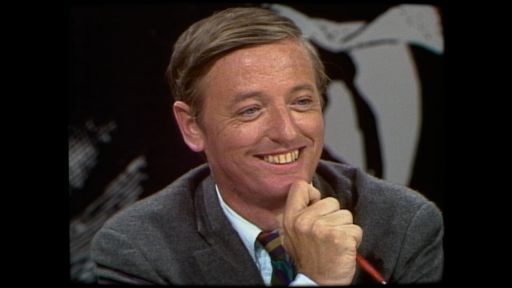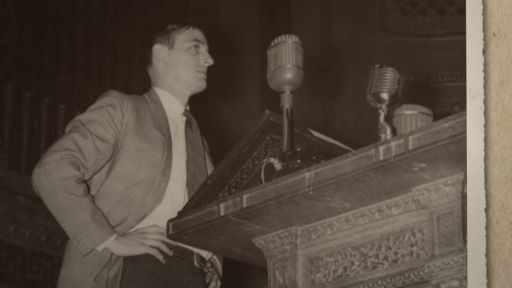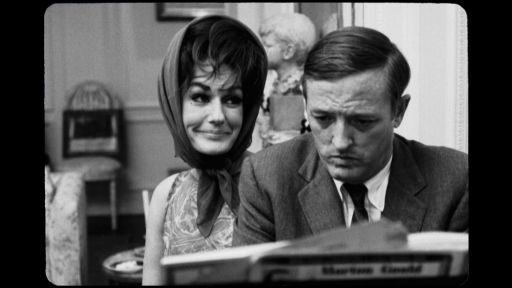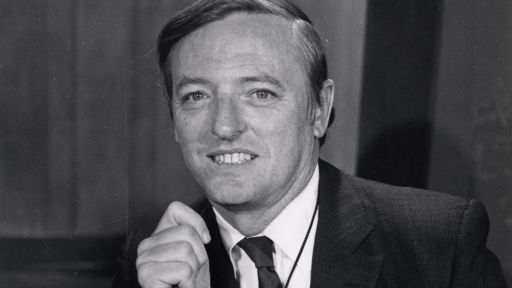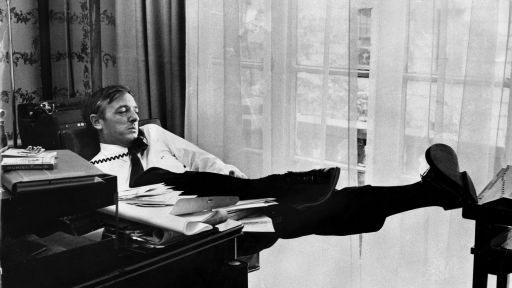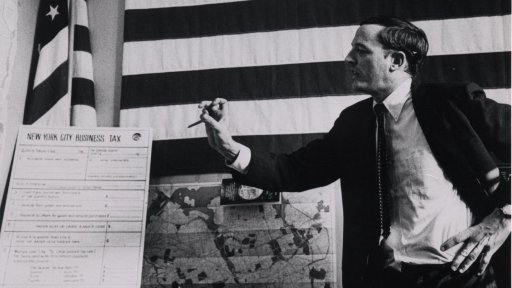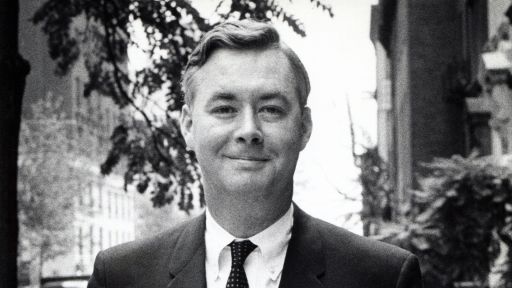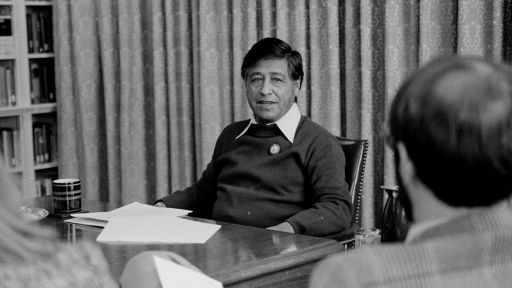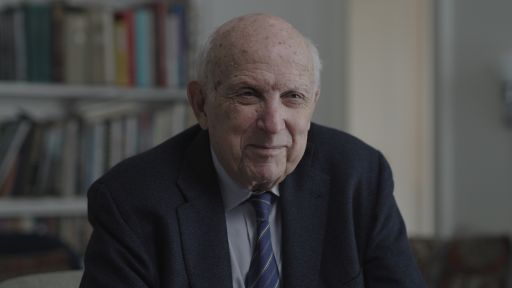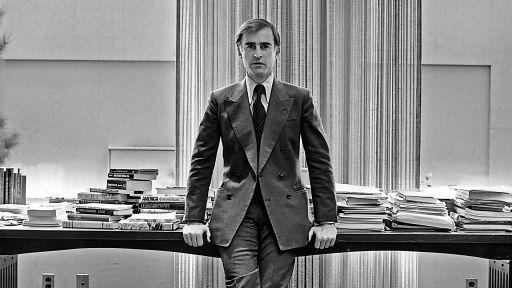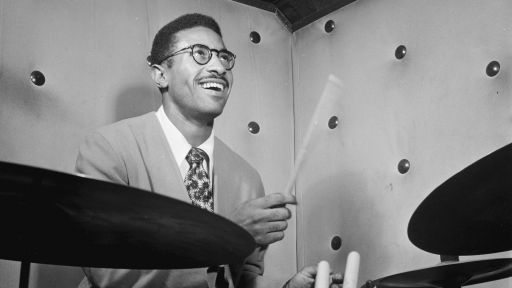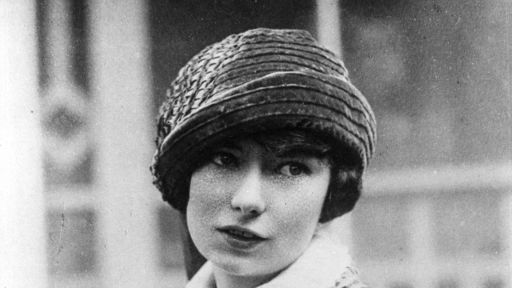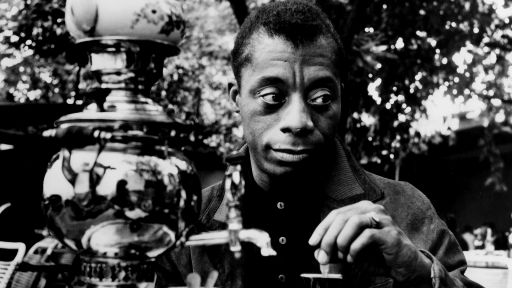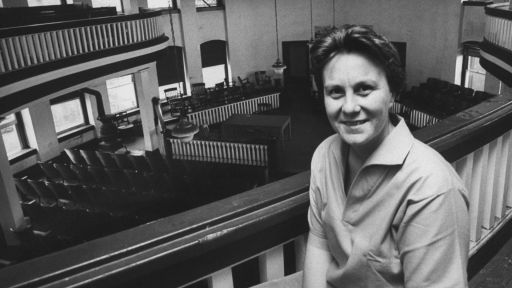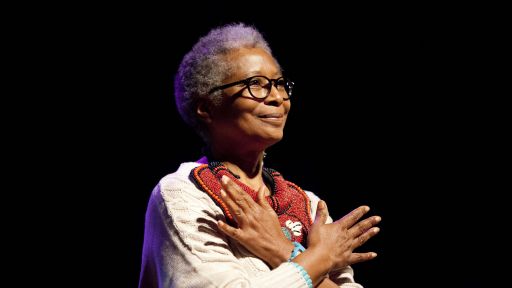TRANSCRIPT
(audience applauds) - Mr. Buckley, I've noticed that whenever you appear on television, you're always seated.
Does this mean you can't think on your feet?
(audience laughs) - It's very... very hard to stand up carrying the weight of what I know.
(audience laughs) (audience applauds) (light music) - [Speaker 1] And now, will you welcome, please, a man who's been described in a million different ways.
- [Speaker 2] He's articulate, provocative, a scourge to some people and a hero to others.
- [Speaker 3] I always find him fascinating.
- [Speaker 4] Very, very strong opinion.
- [Speaker 5] One of the most controversial and charming men on television, Mr. William F. Buckley Jr. (audience applauds) - [Speaker 6] Bill Buckley was so refreshing.
He was so exciting.
- It seems to me that whoever said that was trying to be provocative.
Whether he is naturally or affectively stupid, I don't know.
(host laughs) (audience applauds) - [Speaker 7] Whether you agreed with him and loved him, or he enraged you, Buckley made everybody's blood run quickly.
- I think that you use the word violence with such slovenliness as to render yourself unintelligible.
- [Speaker 8] This is the William F. Buckley America knows best, the man someone called the King of Leer, grimacing or incredulous or disdainful.
- Mr. Buckley, you once called Harry Truman the nation's most conspicuous vulgarian.
You said of General Eisenhower that when he touches a subject, every ray of light, every breath of air is choked out.
Of the Kennedy administration, I quote you, "There are not enough psychiatrists to cure this crazy administration."
And you've called President Johnson, Uncle Corn Pone.
- I didn't say that about Kennedy.
I said the other three though.
- [Interviewer] Right.
- I'd be glad to elaborate on them.
(group applauds) (quirky instrumental music) - [Speaker 9] Bill was so big that he wasn't one thing.
A political man, yes, but also a literary one.
A provocateur, a public brawler, but also a kind of poet.
- [Speaker 10] He wanted to encompass as many forms of conservatism as he could.
- It certainly isn't just rich people, it certainly isn't just poor people.
It certainly isn't just Westerners or just Middle Westerners.
There are conservatives everywhere I've been in America.
- [Speaker 11] It wasn't about personal power, it was about building a movement.
- Conservatives paid $1 each to see William F. Buckley Jr.
There was nothing fancy on the menu here, just hot tongue and cold shoulder for everything distasteful to the conservatives.
- [Speaker 11] Without William Buckley, conservatism as we understand it would never have happened.
- [Group] We want Buckley!
- [Speaker 12] Buckley said that he was a revolutionary against the establishment.
An intellectual revolutionary.
- [Speaker 12] I can't think of anyone who you would compare him to over the last three-quarters of a century who had the impact that he had on American political life.
To have built the kind of edifice of ideas and institutions that Buckley did is astonishing.
It's just astonishing.
(quirky music continues) (typewriter clacking) (typewriter dings) - [Producer] William F. Buckley?
- [Buckley] All set.
- [Speaker] Start.
- Why are the races unreconciled?
Why does poverty persevere?
Why are our governors indifferent to us?
Why are the young disenchanted?
Why do the birds sing so unhappily?
It is easy to be carried away, and yet always, there is a strain of seriousness, something in the system that warns us, warns us that America had better strike out on a different course rather than face another four years of asphyxiation by liberal premises.
(crowd cheers) (pensive music) - [Sam Tanenhaus] There is no political movement that comes close to the American conservative movement, where you actually have a different idea about what the country should be like, and then over time, the country gets there.
And that's what happened with this conservative movement.
- Under liberalism, America hasn't prospered.
- [Sam Tanenhaus] Bill Buckley was one of its best writers, maybe its best debater.
He was its voice, he was its face.
There's the Whitman line, you know, "I contain multitudes".
Buckley did contain multitudes within himself.
- This is William F. Buckley Jr. in New York.
(indistinct) Perfect.
- [Speaker] Good.
(Buckley chuckles) (pensive music) - [Christopher] My father was a man of many parts.
If you ask me what I was most proud of, it was his generosity of soul.
I have a hard time imagining Pop sitting down at his desk and thinking, "I shall become a leader."
You know, I think it evolved much more organically.
(pensive music continues) Someone once wrote my father and said, "Mr. Buckley, what is the secret to happiness?"
And he wrote back, "Don't grow up."
He was raised in, I guess you could call it a bubble.
It was sort of, you could call it Buckley World.
(pensive music continues) (car whooshes) In 1923, the family bought a house in Sharon, Connecticut, and it was called Great Elm because there was an enormous elm tree.
I think it was the largest and oldest elm in Connecticut.
(engaging music) (bird squawks) - [Kevin Schultz] Great Elm was a world unto itself.
It's this huge estate filled with six pianos so all the children could practice on their own.
(engaging music continues) The family was unbelievably insular.
Nobody had to go outside of the walls in order to encounter any part of life.
- [Speaker] They don't go to the local school.
They have a school that they hold within their house.
They have a variety of tutors in academic subjects, tutors in ballroom dancing and horse riding.
(hooves clopping) They were learning French, learning Spanish, learning how to sail, learning how to hunt.
- [Speaker] It was like a summer camp and a liberal arts college right there at the estate.
- [Speaker] The Buckley children had an opportunity to inspire each other, to challenge each other, driven by their father.
He really was sort of the headmaster of this academy.
- [Christopher] My grandfather was a fascinating guy.
He grew up dirt poor.
He went down to Mexico and got into the oil business, and it was boom and bust.
Eventually, he found a lot of oil.
- [Matthew Continetti] Will Buckley was searching for fortune, but he got caught up in a lot of revolutionary movements in Latin America, and I think that instilled in him a distaste for disorder and a fear of revolt.
And he communicated that to his children.
- [Christopher] My grandmother was an enchanting woman.
We called her Mimi, Aloise Steiner Buckley.
Deeply, deeply religious.
She gave my father a religious faith that was the molten core of his being, and I think you could extrapolate from that everything about my father.
(engaging music) - [Matthew Continetti] That devotion ends up being kind of at the core of Buckley's understanding of what love is, love of one's friends, one's family, and one's country.
- [Lee Edwards] This was Will Senior's pedagogical idea to say, "I'm not going to entrust this to government to take care of my children.
I'm gonna create this perfect brood of young people."
(engaging music continues) He's trying to extract the very best from his children, challenging them again and again.
Bill Buckley Jr. really learned how to defend himself and to stake out positions which nobody else had staked out.
(engaging music continues) - [Matthew Continetti] There were frequent guests, and among the guests was a major influence on Buckley, the literary journalist, Albert Jay Nock.
Nock was a former Anglican priest who abandoned his family to become a intellectual aristocrat.
- [Christopher] Nock's theme was essentially, civilization was in decline, (typewriter clacks) and it had come down to what he called the remnant, which was a very limited number of people who could really be trusted to lead wisely.
(engaging music continues) - [Beverly Gage] That central thought that there is a noble remnant of highly educated men in particular, who were going to stand apart from society, who could see things that other people couldn't see, loomed very large for Buckley and it really becomes part of the sensibility of the conservative movement.

